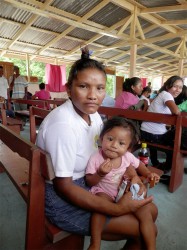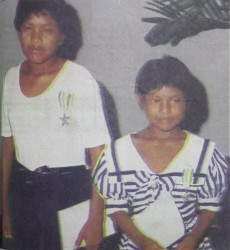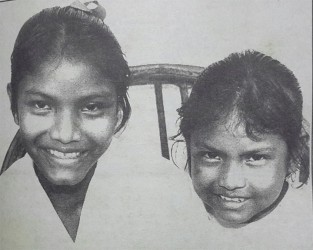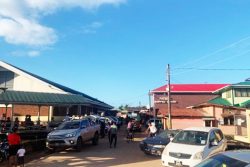In her first glimpse of humans, weeks after wandering lost in the jungle near starvation with her sister, watching her uncle die, and escaping a stalking jaguar, 13-year-old Bertina Domingo felt the courage drain out of her.
“I was frighten and my sister tell me ‘don’t frighten, leh we shout for them,’” she recounted. “We stand up and watch them long…I tell her ‘you shout,’” Bertina recalled. As her then 9-year-old sibling Bernadette Domingo shouted, they were eventually noticed by miners who were on the other side of the river and they came over to the siblings. “They wan know who is them keeping noise,” Bertina said.
“We tell them we lost, we tell them we uncle make we get away and we lost,” she said, adding that the miners wanted to know if there were other people close by.
There were no others and on May 8, 1995, over a month after wandering lost in the dense forest, Bertina and Bernadette, who survived using their traditional knowledge after watching their uncle die, finally glimpsed human beings again. “I feel glad when I see them people,” Bertina recalled adding that she was also scared. The sisters were eventually brought to Georgetown and after their gripping story of survival was made public, the sisters were hailed as heroines and the following year, were awarded the Medal of Service by the late President Dr Cheddi Jagan.
Nineteen years later, Bertina, who once expressed a wish to be a nurse, still remembers the incident though she hardly ever talks about it, she told Stabroek News in an interview in the remote rainforest community of Apoteri in Region Nine recently. At 32, she is now the mother of six children and living in Apoteri, farming and fishing in the jungle surrounding the remote village located at the confluence of the Rupununi and Essequibo Rivers.

“I can’t remember all now,” Bertina said quietly, holding her daughter Lydia. She explained that she hardly ever talks about it, then added that her sister now lives in Brazil. Speaking softly, she recounted the questioning from her parents when she returned home and recalled telling them what happened.
Her uncle Anselmo Henry had picked her and Bernadette up one afternoon after school while her parents were at the farm. “I don’t know where he was taking us, He just carry us,” she said. “He take us in the night and he tell us to sleep in the boat and we small already, we sleep cos we din know what is happening,” she recounted.

Bertina said that when she woke, they were far down the river and she and Bernadette started to cry. “He tell we to stop cry. We tell he we want to come back and he told us he want to take us to our brother,” she said. Their brother was working on the coast. “Then he seh ‘stop cry before I beat y’all,’” she related saying that Henry repeated that he was going to take them to their brother.
Bertina recalled that her uncle continued paddling down the Essequibo and as the miles passed, she no longer recognized where they were. “We just start crying, cry all the time, we no stop crying,” she said. They did not have anything to eat but eventually they reached a place where their uncle had apparently worked before and he made them start walking. “Then we start walk, walk, walk all the time,” she said.
The woman recalled that eventually her uncle got sick. She said that before he left Apoteri, he had been taking medicine but during their journey, he relapsed. “Then he start getting worms on his body,” she said, describing it as being all over his body, even on his head. They watched as he died and then left.

Bertina and Bernadette kept walking along the banks of the river and used “fire sticks” to catch fish. “We just deh shining fish with just the fire sticks,” she recalled, explaining that they pasted the gum from the haiwa tree to the end of the stick and lit it afire. They then blinded the fish by swinging the lit sticks close to where they thought fish would be and chopped the fish with a cutlass they had. “When fish sleep, we does chop them,” Bertina said.
She recounted that they had one hammock and slung it high up in the branches of the trees to sleep. She was scared, she said, of jaguars and snakes.
Bertina recalled that for miles they cried as they walked through the dense jungle and eventually realized that they were being stalked by a jaguar. “My sister was crying, I was crying and eventually jaguar start coming to us,” she recounted. She said that as they walked, she and her sister also kept shouting and felt that it was the noise that attracted the jaguar. She said that they had noticed it behind them on the track. “It was a big jaguar,” she said. “When it coming, we climb high up on the treetop,” she recalled, recounting seeing it as it passed under them. “When it pass, my sister fall down from the tree, the branch break down with she…I tell she to climb back up quick in case it come back…she climb back again, we deh crying on the treetop.” The jaguar never returned.
They had walked with matches but these were soaked by the rain and they had to keep a piece of wood alight as they walked. “All the time we keeping fire on the wood,” Bertina recalled.
Eventually, they heard some noise but it was far away. They continued walking until they spotted the miners’ camp and here Bertina’s courage deserted her until she was urged by her younger sister to shout for them. “They was far from the river on the other side and we shout for them,” she said recalling the miners questioning them. One of them was George Gonsalves. She said that the miners fed them. “They seh they got to wash-down and then they will take we to Kwakwani,” Bertina recalled.
She said that she eventually started to get sick and after the wash-down, the miners took them to Kwakwani and eventually to the hospital in Georgetown.
When their story was reported, it made headlines nationally and internationally. The sisters were visited in the hospital by Dr Jagan and the following year were recipients of the Medal of Service from the late president.
Bertina said that among other gifts, they were given a sum of money and it was placed in the bank. According to a Stabroek News report at the time, $65, 500 was handed over. “They were promising us when I complete 18 years, when my sister complete 18 years, we could go to the bank and collect our money,” Bertina said, adding that the “government people” said so. She said that Dr Jagan had told them they would get money. “The minister was Janet Jagan husband,” she said referring to the late president.
However, to date she has not been able to access the money and she has not returned to the city. Bertina said that she does not know how to access her account and does not know the account number. Upon her return to Apoteri, she resumed school and attended up to Form Two as it was the highest class in the community. When she was awarded the medal, she had expressed a desire to become a nurse, but this did not happen and she had no chance to write any exams. Bertina remained in Apoteri and once, she said, she got sick and had to go to the hospital and upon her return, a box which contained her precious documents including the bank slip and the medal had been emptied. She does not know what became of the items.
She is now the mother of six including a 15-year-old boy who is working in the goldfields, an 11-year-old girl who is preparing to write the Grade Six exams next year, a 10-year-old girl, a 6-year-old boy and a 4-year-old boy who are all in school. Her youngest child is a one-year-old girl.
Bertina said that she would like to access the money as soon her 11-year-old daughter would be sent to secondary school in Annai and would be boarding there. She said that her father is not working at the moment and it is difficult to get items in the remote community.
Meantime, after leaving school at Form Three, Bernadette subsequently moved to Brazil where she now works in a restaurant. She too has not been able to access the money, Bertina said. Bernadette has five children who live with her. The last time she saw her sister was three years ago when she returned to the community briefly, Bertina related.






